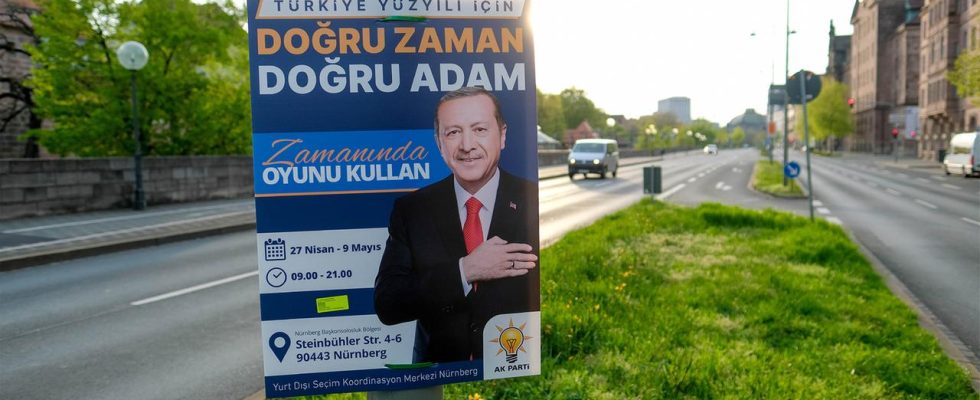exclusive
In Germany, they are actually forbidden from campaigning – but President Erdogan and his AKP, largely hidden from the public, have massively mobilized and polarized here too.
Cell phone pictures from a bus on the way to a Turkish polling station in Germany: one of the organizers of the shuttle service shows how to vote, literally: “On this slip of paper you cast your vote for Erdogan,” he explains to the passengers . Those who vote for the opposition belong in hell: “They are traitors, they don’t work for Turkey.”
It has probably never been as close as in this election for the Turkish President: Even in Germany, he is no longer sure of the comfortable majority from previous elections. But his helpers in Germany have structures that have been built up over years in order to mobilize as many voters as possible – and they do not shy away from propaganda and hate speech, as research by the ARDmagazine monitor show.
performance bans “cleverly subverted”
According to its own statement, the Turkish governing party AKP had tens of thousands of election workers in Europe, most of them in Germany. Largely unnoticed by the German public, they campaigned massively for votes for Erdogan and the AKP, says Eren Güvercin. He is one of the founders of the Alhambra Society, an association for liberal Muslims.
Güvercin has been documenting the election campaign activities of Erdogan’s AKP and its networks in Germany since last year and comes up with at least 120 visits by AKP MPs and officials. However, they were not registered as election events, and for good reason: for five years, public appearances by public officials from non-EU countries have had to be approved in Germany, and three months before an election there was even a general ban on appearances in Germany.
According to Güvercin, these regulations were “cleverly subverted”: The visits of the AKP MPs were announced as cultural events, concerts or breaking the fast, says Güvercin. In fact, there was an election campaign.
diatribes against political opponents
And again and again with hate speech against political opponents, like in a mosque in Neuss. The video of the visit of the Turkish AKP MP Mustafa Acigöz in mid-January circulated on social media: “Just as we won’t give them the right to live in Turkey, we won’t give them that in Germany either. No matter where they flee, we will destroy the PKK and Feto terror supporters,” the AKP man swears to the people.
The political opposition – defamed as terrorists, threatened with death. NRW Interior Minister Herbert Reul also warned this week about prohibited influence in Germany: “Sometimes this takes place in ways and with methods that are unacceptable,” he said on ZDF.
Erdogan influence organizations
However, only rarely were such methods made public. Election campaign appearances went under the radar, but were perfectly organized, especially by the Union of International Democrats (UID) – an association that says it works against Islamophobia and racism. In fact, the North Rhine-Westphalian Ministry of the Interior writes that he is the “most important influence organization” of Erdogan’s AKP monitor-Inquiry.
Erdogan and his AKP founded the UID in Cologne in 2004, at that time still under the name UETD. Since then, the unification has been the “strategic bridgehead between AKP voters and Turkey’s state institutions, such as the consulates,” says political scientist Burak Çopur.
Last year showed how close the connection with Erdogan is. At a meeting in Ankara, Erdogan pledged UID officials to the forthcoming election campaign: “The biggest task in this matter lies with the Union of International Democrats, i.e. with you. […] Don’t forget: one people, one flag, one nation, one state!”
Mosques as “AKP branches”?
The state religious association DITIB, to which around 900 mosques in Germany are affiliated, also plays a central role in the presidential elections in Germany. The DITIB reports directly to the Turkish religious authority Diyanet and thus to the President.
In the months leading up to the elections, many mosques “almost mutated into AKP branches,” says Güvercin. Letters from the president were distributed to the faithful, and buses drove directly to the elections from many mosques. This is taking revenge for the fact that Germany for a long time largely left the religious affairs of Muslims to the Turkish state, says Deniz Yücel.
The German journalist was imprisoned in Turkey for more than a year for alleged terrorist propaganda. He has experienced first-hand how the “Erdogan system” deals with critics and political opponents and also knows how far the Turkish president’s network extends into Germany: “To the extent that Erdogan is aware of all state institutions, i.e the judiciary, the army, the police for its political purposes, of course, that also applies to the mosque associations. It’s used for the election campaign, it’s used for hate speech,” says Yücel in an interview with monitor. Neither the AKP nor the UID or the DITIB have answered written inquiries about these allegations.
According to journalist Yücel, Erdogan’s network is also active in Germany.
Almost three quarters of a million voters in Germany
The votes of Turkish voters from Germany will not be counted until election day in Turkey, May 14, 2023. According to the Center for Turkish Studies, more than 730,000 people in Germany voted. The polling stations in the German consulates are now closed. The mobilization of the AKP may have paid off: almost half of all eligible voters in Germany cast their votes, three percent more than in the previous elections.

